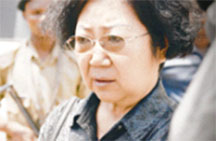DAR ES SALAAM, (Reuters) – A Tanzanian court has charged a prominent Chinese businesswoman, dubbed the ‘Ivory Queen’, with running a criminal network responsible for smuggling tusks from more than 350 elephants, court documents seen by Reuters yesterday showed.

Yang Feng Glan, 66, was accused in Tanzania’s commercial capital, Dar es Salaam, this week of smuggling 706 pieces of ivory between 2000 and 2004 worth 5.44 billion Tanzanian shillings ($2.51 million).
Glan, a Swahili-speaker who has been in the east African nation since the 1970s, is secretary-general of the Tanzania China-Africa Business Council and owns a popular Chinese restaurant in Dar es Salaam, according to police sources.
Reuters was unable to reach the lawyer for Glan who was not allowed to enter a plea until the case resumes.
She is being held at the city’s Segerea maximum security prison until an Oct. 12 bail hearing. If convicted, she could face more than 20 years in jail.
In the court documents, prosecutors said Glan “intentionally did organise, manage and finance a criminal racket by collecting, transporting or exporting and selling government trophies” weighing a total of 1.889 tonnes.
The East African nation’s elephant population shrank from 110,000 in 2009 to a little over 43,000 in 2014, according to a census released in June, with conservation groups blaming “industrial-scale” poaching.
Demand for ivory from fast-growing Asian economies such as China and Vietnam, where it is turned into jewels and ornaments, has led to a spike in poaching across Africa. Conservation of African big game has also been in the international spotlight in last few months since the killing of famed Zimbabwean lion Cecil by an American dentist. China, the world’s biggest consumer of elephant tusks, announced in February a one-year ban on the import of African ivory carvings, but conservationists say corruption is fuelling poaching in Tanzania.




